Featured Blog
Standing in solidarity during times of crisis: Urgent support for Lebanon
The ongoing conflict in Gaza has had a ripple effect in Lebanon with continued armed confrontation on Lebanon's southern border, leading to a dire humanitarian crisis.

Caritas Lebanon waving a flag. Photo: Caritas Lebanon.
View Filter
Filter by
Clear Filters
Filter by
Viewing 1-20 of 323
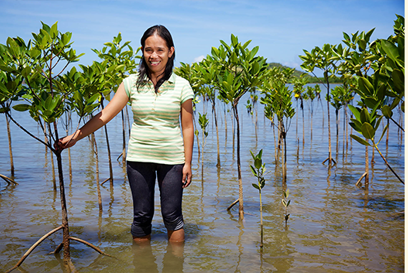
Aloma standing among the mangroves in the Philippines. Photo credit: Richard Wainwright/Caritas Australia.
Around the world, millions of women and girls continue to live in poverty, facing the challenges of gender inequality and discrimination, with poor or limited access to health care and education. But you can help change that.
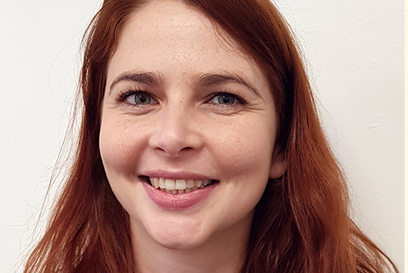
Emma Dawson, Pacific Program Manager. Photo credit: Caritas Australia.
03 AUG 21
Q & A with Emma Dawson, Pacific Program Manager, Caritas Australia. In the first year of the pandemic, the Pacific was quite lucky in that most countries almost went a year without any COVID-19 cases. In 2021, we’ve seen really concerning rises in the number of confirmed cases, particularly in Papua New Guinea and Fiji. This has had a big impact on their flailing health systems, poverty levels and their economies, and we have also been seeing a rise in cases of gender-based violence.
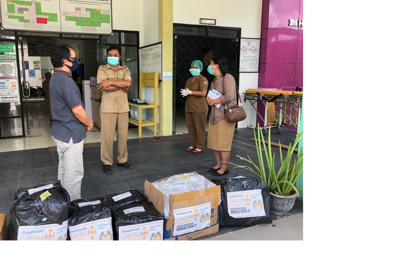
Distribution of PPE to health centres. Credit: Caritas Indonesia.
Indonesia has recorded its highest daily death toll from Covid-19, amid a second serious outbreak of COVID-19. As it continues to battle the spread of the virulent Delta variant, with your support, we’re working on the ground to help the most vulnerable, marginalized communities.
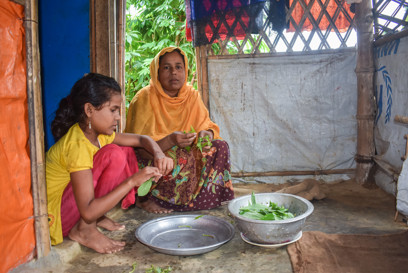
A UN report has shown significant increase in world hunger during the COVID-19 pandemic. With our local partners, we're working to support the most vulnerable communities around the world. Credit: Inmanuel Chayan Biswas
World faces most significant increase in hunger in decades
A report released by the UN this month shows that the COVID-19 pandemic has contributed to the most significant increase in world hunger in decades, with global hunger increasing last year by 18 per cent compared to the year before.
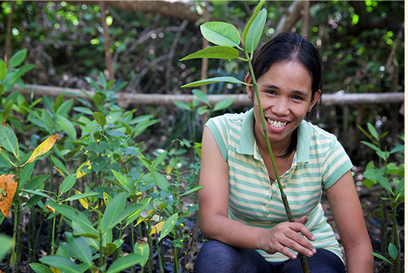
Women For The World Tackling Gender Inequality And Discrimination. Photo credit: Richard Wainwright/Caritas Australia.
Women for the World brings Australians together to support vulnerable woman and girls around the world. It’s an initiative that crosses borders, connects communities and creates lasting change.
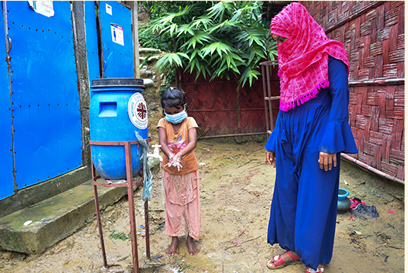
Halima showing her children how to use a hand-washing station in her Rohingya refugee camp in Cox’s Bazar, Bangladesh. Photo credit: Inmanuel Biswas/Caritas Bangladesh
As Australians line up for their COVID-19 vaccinations, the world’s most vulnerable communities continue to struggle with deadly outbreaks – with little hope of a vaccine in sight.
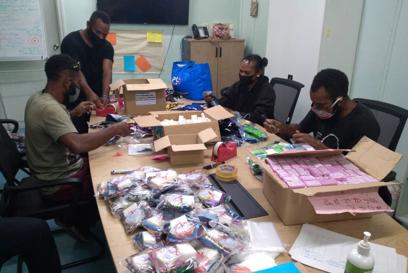
Staff in PNG putting together hygiene kits to distribute to local communities. Photo: Caritas Australia PNG.
In the wake of the devastating outbreak of COVID-19 in Papua New Guinea, the majority of communities in remote areas still have extremely limited knowledge of the virus and how to prevent its spread.
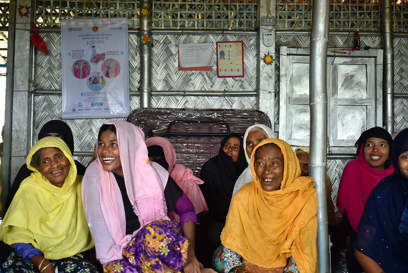
Jamila (centre) joins other women in the Women Friendly Spaces project, run by Caritas Bangladesh, in a refugee camp in Cox’s Bazar, Bangladesh. Photo credit: InmanuelBiswas/Caritas Bangladesh
This World Refugee Day, we’re celebrating the Rohingya refugees working together to improve living conditions and community safety in Cox’s Bazar, the largest refugee camp in the world.
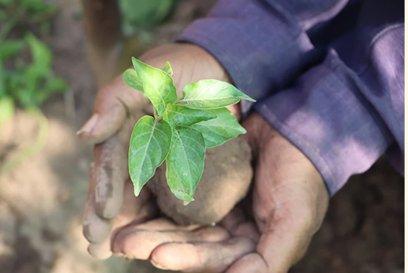
World Environment Day 2021. Photo credit: Sam Rinang, ARD.
Today is World Environment Day, the United Nations day for encouraging global awareness and action to protect our shared environment.
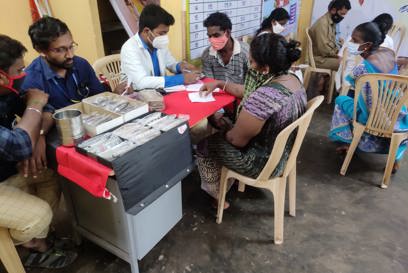
Basic Medical Kits distribution. Photo: Caritas India
In addition to the devastating loss of life from COVID-19, the country has been hit by two extreme cyclones in as many weeks.
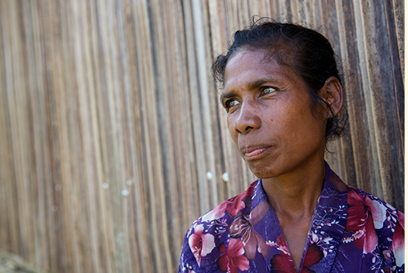
Tackling Gender-Based Violence (GBV) in Timor-Leste. Photo credit: Richard Wainwright/Caritas Australia.
Every day, Timorese women like Martina seek refuge from domestic violence.

Unpacking lifesaving PPE in PNG. Photo: Caritas PNG.
We welcome the incredible $356,200 that Catholic Health Australia members have raised to fight COVID-19 in Papua New Guinea (PNG).
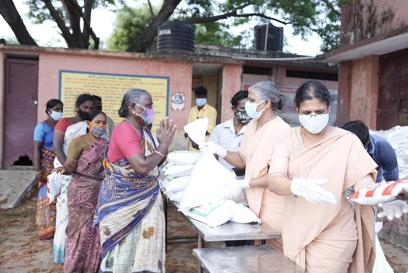
Emergency rations are distributed to vulnerable communities through our partner, Caritas India. Photo: Caritas India
28 APR 21
India is struggling to control a massive surge in COVID-19 cases, with a death toll nearing 200,000, after another 2771 deaths were reported on Tuesday.
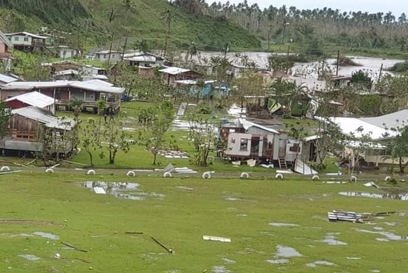
Communities in Fiji are still recovering from the damage after Tropical Cyclone Yasa in December 2020. Photo: Fiji Broadcasting Corporation.
Fiji’s two largest cities are in lockdown after the first reported case of COVID-19 community transmission in 12 months.
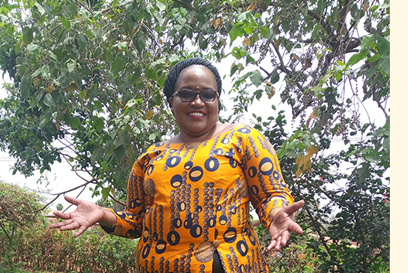
Rither Mallewo, Coordinator of the Tanzanian A+ Program in the Diocese of Mbulu Development Department (DMDD).
Rither Mallewo, Coordinator of the Tanzanian A+ Program in the Diocese of Mbulu Development Department (DMDD), speaks about the way that your support has enabled improved community development in Tanzania.
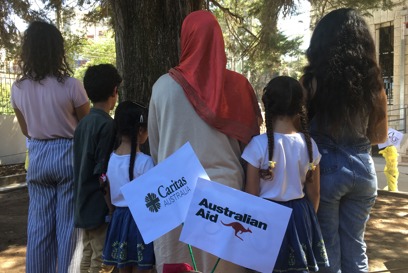
We are unable to share photos of families at the shelter for their protection. Photo: Caritas Lebanon
On March 15 this year, the conflict in Syria turned 10 years old. The Syrian conflict has driven over 6.6 million Syrians to flee the country, and a further 6.7 million people to relocate due to conflict within the country.

Caritas Bangladesh Staff Member assesses damage after fires in Cox's Bazar. Photo: Anthony/Caritas Bangladesh
On March 22, a massive fire swept through the Rohingya refugee camp in Cox’s Bazar, Bangladesh, leaving approximately 45,000 people homeless.
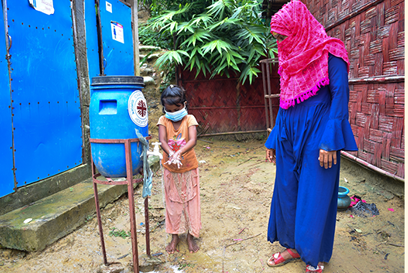
Halima showing her children how to use a hand-washing station in her Rohingya refugee camp in Cox’s Bazar, Bangladesh. Photo credit: Inmanuel Biswas/Caritas Bangladesh
22 MAR 21
On World Water Day, we celebrate water and raise awareness of the 2.2 billion people living without access to safe water. It is about taking action to tackle the global water crisis.
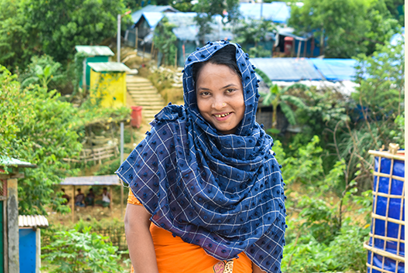
Halima returning from collecting water from a pump near her shelter in a refugee camp in Cox's Bazar, Bangladesh. Photo credit: Inmanuel Biswas/Caritas Bangladesh
17 MAR 21
Halima is raising two children in a refugee camp in Bangladesh, while caring for her mother who has a disability. Widowed at just 21, Halima fled violence in Myanmar’s Rakhine State in 2017, arriving at the camp with nothing.

Arsad with his neighbours in Pandeglang District, Indonesia. Photo credit: Caritas Australia.
Arsad, an Indonesian farmer, had no toilet in his home so he had to walk into the forest to the open defecation area, even at night or in the rain. Around 17 percent of Indonesia’s rural population practice open defecation, with many unaware that it contributes to spreading diseases.
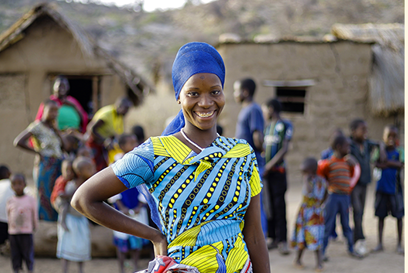
Oliva stands near her home in Karatu District, Tanzania. Photo credit: August Lucky.
03 MAR 21
Oliva, a twenty-two-year-old woman living in Tanzania with her farmer husband, two young sons and an adopted niece and nephew, didn’t have the opportunity to go to school growing up.
What can we help you with?
Speak with us
Call our Supporter Services team for assistance. Our lines are open Mon-Fri 9am-5pm AEST.
1800 024 413Contact Caritas Australia
Send us an enquiry and we’ll be in touch. We’d love to hear from you!
Contact UsSee our FAQs
Visit our FAQ page to learn more about the work of Caritas Australia and find answers to our most frequently asked questions.
FAQsDonate now to provide support where it's most needed today
Donate Now











